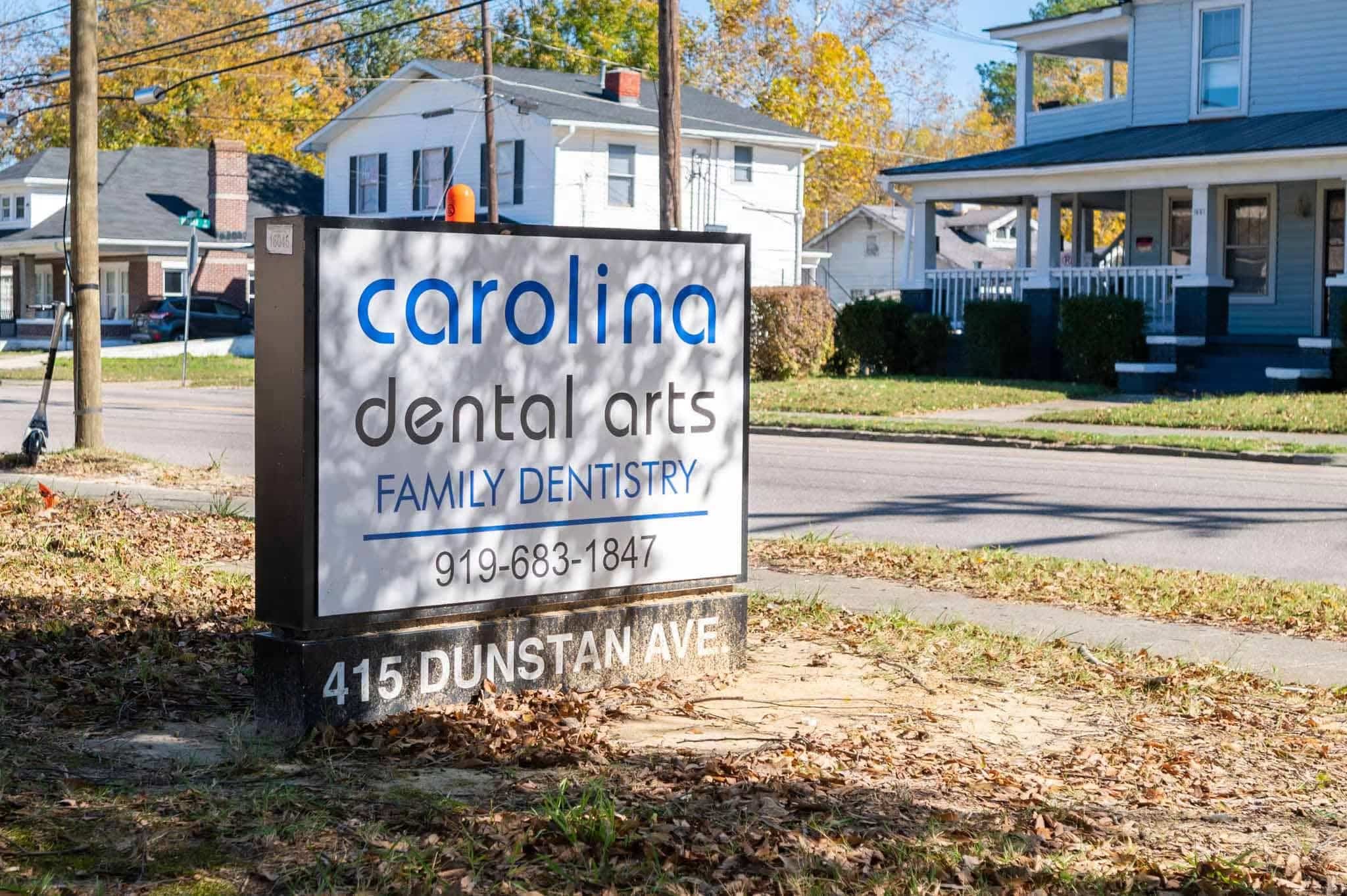Root Canal Treatment in North Carolina
Providing quality endodontic treatment in Durham, Raleigh, and Goldsboro.
Root Canal Treatment in North Carolina
Providing quality endodontic treatment in Durham, Raleigh, and Goldsboro.
Did you know that dentists will perform over 41,000 root canals today? This common treatment is a crucial restorative procedure as it can save your tooth from extraction. While there are many myths about painful root canals, the truth is that modern dental techniques have made the procedure nearly pain-free. In fact, root canal treatment is meant to alleviate pain, not cause it. By removing the infected tissue within the tooth, we can restore the tooth’s function and preserve your beautiful smile.
At Carolina Dental Arts, we pride ourselves on our comprehensive range of services. From routine cleanings and orthodontic treatments to root canals and dental implants, we provide essential dental services to treat the whole family.
Understanding Root Canal Treatment
A root canal refers to a structural element of the tooth and the treatment that restores this element when infected.
A tooth is composed of several layers. The outermost layer is the enamel, which is the hard, protective surface of the tooth. Beneath the enamel is the dentin, a less dense but still strong layer that supports the enamel and carries some nerve fibers. At the core of the tooth lies the pulp chamber, which contains the tooth’s nerve tissue, blood vessels, and connective tissue.
The pulp extends down through the root canals, which are narrow, tunnel-like structures reaching from the pulp chamber to the tip of the tooth’s roots. A root canal procedure is necessary when the pulp becomes infected or inflamed due to decay, injury, or other factors. During this treatment, we remove the infected pulp and disinfect the tooth’s interior before sealing it to prevent reinfection. This process helps preserve the tooth’s structure and function, allowing it to remain in place and continue contributing to your oral health.
Why Does a Root Canal Become Infected?
A root canal can become infected for several reasons:
- Deep decay: When a cavity penetrates deeply into the tooth, bacteria can reach the pulp, causing infection.
- Repeated dental procedures: Multiple treatments on one tooth can irritate the pulp, increasing the risk of infection.
- Cracks or chips: Cracks or fractures in a tooth can allow bacteria to enter the pulp chamber, leading to infection.
- Trauma: A traumatic injury to the tooth, even without visible chips or cracks, can cause damage and make the pulp susceptible to infection.
- Faulty crowns: Poorly fitted crowns can create spaces where bacteria can accumulate, eventually leading to an infection in the pulp.
- Gum disease: Severe gum disease can affect the roots of the teeth, potentially infecting the pulp.
Who Needs Root Canal Treatment?
A common symptom of root canal infection is persistent or severe tooth pain. You are likely to notice this pain when you chew or apply pressure to the affected tooth.
While many patients schedule an appointment due to unrelenting pain and discomfort, other signs that you might need a root canal are:
- Prolonged sensitivity: Sensitivity to hot or cold foods and beverages, especially if the discomfort lingers, can be a sign of pulp damage.
- Swollen gums: Swelling around the affected tooth may occur, and the gums might be tender or painful to the touch.
- Darkening of the tooth: A tooth that looks darker than surrounding teeth might have internal damage or decay.
- Pimple on the gums: A dental abscess can indicate an infection of the pulp. These small, pimple-like bumps appear on the gums near the infected tooth. Abscesses generally cause throbbing, shooting, or sharp pain.
- Loose tooth: An infected tooth might feel loose due to the weakening of the surrounding bone structure.
- Bad taste or smell: An infection can produce a persistent bad taste or odor in the mouth, indicating the presence of pus or bacteria.
- Swelling in the face or neck: In severe cases, infection can cause noticeable swelling in the face, neck, or lymph nodes.
When the pulp inside the tooth becomes infected, it can cause pain and swelling and eventually lead to the death of the pulp tissue. If left untreated, the infection can spread to the surrounding bone, leading to more serious health issues.
The Root Canal Procedure
 Root canal treatment is a multi-step procedure designed to save an infected tooth so that it can function normally without pain or discomfort. The entire root canal procedure typically requires one or two visits to complete.
Root canal treatment is a multi-step procedure designed to save an infected tooth so that it can function normally without pain or discomfort. The entire root canal procedure typically requires one or two visits to complete.
The process begins with a thorough examination and X-rays. These steps help us assess the extent of the infection and determine the shape of the root canals. Once we clearly understand the problem, we will administer a local anesthetic to numb the area and ensure you are comfortable throughout the procedure.
First, we will isolate the tooth to keep it dry. We will then make an opening at the top of the tooth to access the pulp. Using special instruments, we will carefully remove the diseased pulp from the pulp chamber and root canals. After the pulp is removed, we will disinfect the tooth’s interior to eliminate any remaining bacteria and debris.
Next, we will shape the root canals to prepare them for filling. We fill the canals with a substance called gutta-percha, which is a rubber-like biocompatible material. After the canals are filled, we seal the opening with an adhesive cement to prevent reinfection.
In some cases, we will place a temporary filling in the tooth to protect it until a custom restoration can be completed. We typically recommend capping a root canal-treated tooth with a dental crown. The crown restores the tooth’s shape, function, and appearance while providing long-lasting protection.
We Can Save Your Smile at Carolina Dental Arts
Root canal treatment is an essential procedure that can save damaged or infected teeth by removing the infected pulp, disinfecting the root canals, and sealing them to prevent additional issues. This treatment not only alleviates pain but also preserves the natural tooth, allowing it to function normally.
Despite common misconceptions, modern root canal procedures are designed to be nearly pain-free, thanks to advances in dental technology and anesthesia. Don’t let the stereotypes deter you from seeking the care you need. If you are experiencing dramatic tooth pain, sensitivity, or other signs of infection, contact us today to discuss whether a root canal is the right solution. Taking prompt action can save your tooth and bring you lasting relief!
Frequently Asked Questions
The American College of Endodontists recommends replacing any tooth that cannot be saved with a dental implant, and we agree. Dental implants are reliable tooth replacement tools that prevent teeth from shifting toward the new space in your mouth. They help maintain your bite and the appearance of your smile while supporting your long-term oral health. By replacing the missing tooth root, a dental implant stimulates the jawbone, keeping it strong. No other restorative solution can prevent bone loss as effectively.
We also offer mini dental implants if you need to replace an extracted or lost tooth and prefer a less invasive alternative. These narrow-diameter implants serve the same function as larger conventional implants with a less invasive procedure, shorter treatment timeline, and lower overall cost.
The most painful part of a root canal is the infection that makes the procedure necessary, not the treatment itself. When the tooth’s pulp becomes infected or inflamed, it can cause severe pain and discomfort. Modern root canal treatments are no more uncomfortable than a dental filling. We use local anesthesia to numb the area, ensuring that you don’t feel any pain throughout the procedure. If you have dental phobia, we also offer nitrous oxide to help you remain calm.
The purpose of a root canal is to alleviate the pain caused by the infection, not to cause additional discomfort. Advances in dental technology have made root canal treatments efficient and minimally invasive.
Root canal treatment lasts a significant amount of time, providing long-term relief and function. According to a study by the Regenstrief Institute and Indiana University School of Dentistry, the median survival duration of a tooth after a root canal is about 11 years.
However, this duration can vary based on several factors, such as the type of restorative work done afterward. Teeth that receive both a filling and a crown can last approximately 20 years, while those that only receive a filling or crown typically last around 11 years. Without any restorative work, the survival time drops to about 6.5 years.
At Carolina Dental Arts, we often recommend placing a custom crown over a treated tooth to ensure its long-term durability.
Related Videos
- Why Should I Not Be Afraid of a Root Canal?
- What Is the Connection Between Oral Health and Overall Health?
- What Is Periodontal Disease?
- What Causes Gum Disease?
- What Are the Dangers of Periodontal Disease?
- What Are the Symptoms of Gum Disease?
- How Can I Prevent Periodontal Disease?
- How Do You Treat Gum Disease?
- What Should I Do if I Have Bleeding Gums?




















